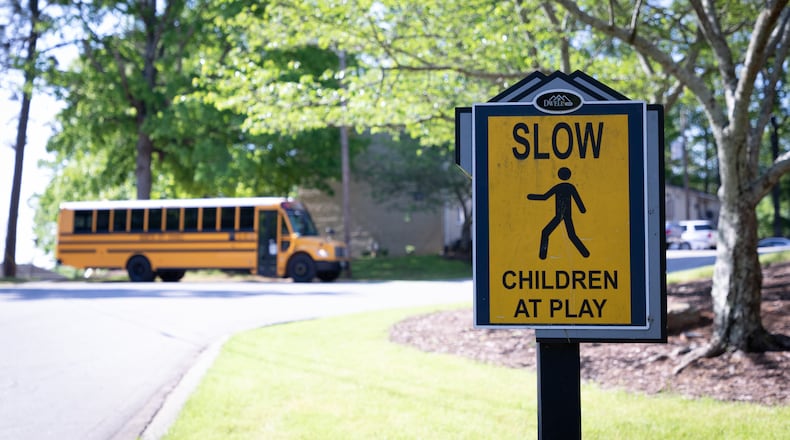As the new academic year gets underway, school districts across metro Atlanta are scrambling to get computers and Wi-Fi hot spots into the hands of thousands of students who need them.
Most districts are beginning the year with all-virtual classes or a mix of in-person and distance learning. Some experiencing computer shortages, such as Clayton County, are asking students to use their personal devices for class so the school system can direct its tight supplies to those without.
Others, such as the Gwinnett County, the state’s largest school system, have refurbished old laptops with newer internal processors to make them usable until newer models arrive.
And Marietta City Schools, in an effort to help students connect to online learning portals, is parking buses equipped with Wi-Fi in neighborhoods throughout the Cobb County city.
“We have families who come and sit on blankets, they’ll come out on balconies, they’ll sit at picnic tables,” Marietta Schools spokeswoman Jen Brock said of bus Wi-Fi operations. “Our commitment has been if you need technology, let us know.”
The dash for laptops, tablets and Wi-Fi hot spots comes as districts are preparing for what could be a long slog of distance learning with a patchwork of solutions to meet the computing needs of students. Some of that requires new spending.
Atlanta Public Schools, for instance, announced last week that it would lease 40,000 Chromebooks and iPads over the next five years for nearly $25 million. In the meantime, it is distributing older Chromebooks to students — machines that had previously been restricted to school buildings.
DeKalb County last month said it, too, intends to purchase new Chromebooks for all its 102,000 students, but did not provide details on the cost or how they would be funded.
Clayton County’s school board in May approved $36.8 million to lease 38,000 laptops over five years that the district expects to get in September. In the meantime, the 55,000-student school system, which began classes on Monday, distributed 35,000 devices to students, leaving around 20,000 using their own devices, according to Clayton Schools Chief of Technology Rod Smith.
Mapillar Dahn heads one such Clayton County family.
Dahn, a mother of three who also takes care of her two nieces whose mother has been deployed in the military, has received three laptops from the school system and is using two personal computers. It’s not an ideal situation, she said, but one that works as a temporary solution.
“My daughter is using my personal computer, which is somewhat impeding my ability to work,” said Dahn, founder and CEO of the MTS Sickle Cell Foundation in Hampton. “I do need to get them Chromebooks soon so I can focus on what I need to do.”
Access to technology remains a problem
Dennis Attick, an assistant dean of the school of education at Clayton State University, said schools were caught off guard in March when the coronavirus pandemic forced them to switch to online learning. The continued lack of equipment indicates access to technology remains a problem.
“Because it’s the 21st Century and internet technology is a part of our lives and social media is such a big part of kids lives, we assume everyone has access to technology and they don’t,” he said. “It’s still an issue for lots of students.”
As the need has grown, school systems have partnered with private businesses and philanthropies to raise money for laptops or to secure free or reduced-cost Wi-Fi.
The Intercontinental Exchange, the Atlanta-based owner of the New York Stock Exchange, gave Atlanta schools $1.3 million for laptops while the Cobb Community Foundation raised $10,000 for digital devices for four South Cobb high schools.
Internet service providers have also struck deals for Wi-Fi.
Henry County Schools has a partnership with Sprint to offer free Wi-Fi to students in the south metro Atlanta community, said Henry Schools spokesman J.D. Hardin. Comcast, the nation’s largest internet provider, said on Thursday that it plans to expand its “Internet Essentials Partnership Programs” for schools to offer cheaper web access to students in low-income families.
The company said it also is working with the city of Alpharetta and the YMCA to offer satellite locations around Fulton County for students who need access to the internet.
Some school systems such as Fulton County and Marietta let students keep the computers they were assigned last year, a move that gave leaders a good look at the continued value of laptops in the home, the leaders said.
“We let students keep their laptops from the school and had a summer program in which we also offered laptops,” Marietta’s Brock said. “So the vast majority of our students already have devices from spring or from summer.”
Kimberley Redd and Ariel Shaw, two parents of Henry County students, said investing in technology makes all the difference.
Henry County used $36 million from its E-SPLOST to buy laptops and iPads for students in the third through 12th grades. That eased the burden on parents who didn’t have to hunt for devices after schools went all-virtual in March, and makes it easier for the district to begin the new school year Monday with students learning at home.
“This has been a positive experience even from the end of last year,” said Redd, who has two students in the school system.
Shaw, the mother of one, agreed. “I’m not usually easy to impress, but Henry County has impressed me.”
About the Author
The Latest
Featured
